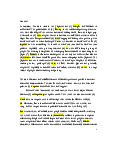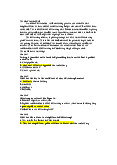




Preview text:
RESEARCH ARTICLE
European Journal of Business and Management Research www.ejbmr.org
Review of Corporate Governance Theories Afshan Younas ABSTRACT
Corporate governance is a mechanism in which conflict of interest betwee
managers and shareholders is managed and control ed. From the perspective Submitted: September 15, 2022
stakeholders’ numerous theories have been proposed and emerged from different
Published: November 09, 2022
perspectives to offer solutions to these conflicts and reduce conflicts among th
stakeholders. This paper talk about corporate governance theories to improve the ISSN: 2507-1076
mechanism of corporate governance understanding from different stakeholders’
DOI: 10.24018/ejbmr.2022.7.6.1668 perspectives. A. Younas*
Faculty of Business Studies, Arab Ope
Keywords: Agency Theory, Resource Dependence Theory, Stakeholders’ Theory, University, Oman. Shareholders Theory. (e-mail: afshan @ aou.edu.om) *Corresponding Author
various authors and organizations, which define the I. INTRODUCTION
terminology ‘corporate governance’ the holistic meaning of
which sums up as the set of codes and rules that controls the
Generally, corporate governance refers to the system by
conflict of interests and strengthen the relationship between
which companies are directed and controlled (Cadbury
Report, 1992). This definition emphasizes that all
the firm’s management, the board of directors, shareholders,
stakeholders are responsible for an effective and smooth
or any other interested stakeholder. Corporate governance
interest alignment of stakeholders. The corporate governance
encompasses those rules and regulations which eventually
mechanism is established to protect the interests of investors,
lead to a more responsible organization, as a result, it led to
shareholders, and all stakeholders (Yusoff & Alhaji, 2014). the company’s leverage.
According to the Cadbury report (1992), corporate Under the corporate governance system, the interest of
governance outlines the responsibilities and duties of an
different stakeholders is aligned and matched. Accordingly,
organization's board of directors to lead the organization
several theories have contributed to improve the governance
of firms with the aim of maximizing
successfully. The board of directors is responsible for the shareholders’ and
smooth implementation of corporate governance. The role of stakeholders’ wealth.
a shareholder in governance is to appoint directors, and
auditors, and ensure that directors are appropriately running II. B C G the structure.
ACKGROUND OF ORPORATE OVERNANCE
Corporate governance is a set of relationships between a The concept of corporate governance has a wider scope and
company’s management, its board, its shareholders, and other
the area of business that incorporates managerial
stakeholders (OECD, 2004). There is no single model of good
accountability, board structure, and rights of shareholders.
corporate governance, however, the principles proposed by
The issue of governance began with the beginning of
Organization for Economic Co-Operation and Development
corporations and the concept existed for centuries, but the
(OECD 2004) for good corporate governance that is based on
name didn’t come in a clear manner until the 1960s. The
common elements and different models that already exist.
concept of Corporate Governance was first highlighted in
Corporate governance is about what the board of a company
1960 by Richard Eells in his paper “The Structure and
does and how it sets the values of the company, and it is to be
Functioning of Corporate Polity” where he discussed how
distinguished from the day-t -day o operational management
agency cost affects financial resources and how this negative
of the company by full-time executives (Gyamerah & Agyei,
effect can be reduced. Till 1970 the concept of Corporate
2016). Thus, this system supports the financial and capital
Governance was confusing but within 25 years this system market of a country.
gained a lot of attraction and now the topic is much debated
The UK Corporate Governance Code (July 2018) defines
in business as well as the literary environment (Cheffins,
the concept of corporate governance as “The purpose of 2011).
corporate governance is to facilitate effective, entrepreneurial The term corporate governance was first used in the United
and prudent management that can deliver the long-term
States, where the balance between power and interest became
success of the company”. There is no specific definition of
the main topic under discussion. After the Second World
corporate governance which defines the scope. There are W
ar, the United States experienced strong economic growth,
DOI: http://dx.doi.org/10.24018/ejbmr.2022.7.6.1668 Vol 7 | Issue 6 | November 202 79 RESEARCH ARTICLE
European Journal of Business and Management Research www.ejbmr.org
corporations were growing and rising, managers were highly A. Agency Theory
influenced by the selection of board directors and things This theory is regarded as the fundamental base for all
began to change. In 1976, the term “corporate governance”
other theories related to corporate governance. This theory
first appeared in the business environment where the
focuses on the contractual relationship nature between
Securities and Exchange Commission (SEC) imposed that
shareholders and management. According to this theory, the
each corporation to have an audit committee composed of all
shareholder's work as principals and management are
independent board directors (Cheffins, 2011).
considered as the agent of owners (Khan, 2011). Shareholders
In the 1980s the focus was imposed on Principles of
are interested in increasing their wealth whereas managers are
Corporate Governance, the focus on these initial principles
working for shareholders, but their priority is an increase in
was on the board of directors, where they were given more
their compensation not only shareholders' wealth. Thus, a
rights and power in governance matters. The principles were
conflict of interest arises, and this cause agency problem
first criticized by the majority of law regulatory bodies and under the principal and agent relationship.
economic scholars but later the principles were approved and Agency theory has it s origins i n the economic theory,
published in 1994 (Khan, 2011).
which is presented by Adam Smith (1776). First-time
After the major financial scandals in 2002 of large separation of ownership to control was discussed by Adam
organizations like Enron and WorldCom, the attention
Smith, who proposed that a manager who controls all
towards Corporate Governance became much higher (Ali,
activities of the firm will not have a keen interest in business
2018). The attention moves toward corporate governance
as he would invest his own money and pointed out some
extensively among professionals and academicians. Many
negligence (Smith et al., 1977). Later, the agency theory was
regulatory bodies issued and revised the principles and codes
further developed by Jensen and Meckling (1976) who
of corporate governance. The basics of such rules and
defined agency theory as a contract between owners and
principles result in the positive effect of corporate governance
management. Moreover, ensuring whether the agent is acting
on the organization (Claessens & Yurtoglu, 2012; Shouvik,
in the principal’s best interest or not. This is based on the 2018).
grounds of an inherent conflict of interest between the agent
As a result of high-profile corporate scandals, major steps
and principal (Fama & Jensen, 1983). Moreover, the conflict
have been taken by governments and professional bodies to
between management and shareholders may also take place
strengthen the oversight of company performance by external
due to the issue of information asymmetry. Fig. 1 elaborates
agencies such as the Securities and Exchange Commission on the agency model.
(SEC) in the USA. The USA also passed the legislation called Different researchers and economists categorized agency
Sarbanes-Oxley Act (SOX) in 2002. In the UK, since the
problems into three types. The first type of problem is
early 1990s, a similar corporate governance system has
identified as Principal-Agent Problem, this problem started
evolved, known as Cadbury Report (1992). Many member
with the operation of a large corporation. Where the
countries of the Organisation of Economic Cooperation and
shareholders assign the administration of business to
Development (OECD) also produced their own country-managers, but managers are more interested in maximizing
specific corporate governance codes. There is also a private
their compensation rather than the interest of owners. The
voluntary body sponsored by several professional accounting
type 2 problem is named as Principal-Principal problem. This
bodies called the Committee of Sponsoring Organizations of
problem exists between the major and minor shareholders of
the Treadway Commission (COSO), which provides
large corporations. Since the major owners have high voting
guidance on corporate governance and business ethics
power so they can take participate in the decision-making
(Braendle & Kostyuk, 2007; Devendra Kodwani, n.d.; process in their favor. The type 3 problem is the Principal – Shouvik, 2018).
Creditor Problem, this problem, and conflict exists between
The OECD was the first organization to offer an owners and creditors due to the financing decision of risky
international code of corporate governance principles, issued
projects (Panda & Leepsa, 2017; Yusoff & Alhaji, 2014).
in May 1999 and was revised in 2004 and 2014. The Generally, agency theory focuses on the opportunistic
principles developed by OCED have been endorsed by World
behavior of managers where they try to put their interests first
Bank and IMF (International Monetary Fund) (Leipziger & by sacrificing shareholders’ interests. As a result, the cost of
Leipziger, 2019). The OECD principles provide guidelines on
solving agency problems is increased because under the
corporate governance practices without imposing any
corporate governance mechanism several measures need to
obligations on the member's organizations. The OECD
be taken by the board of directors such as the establishment
principles enrich the scope of corporate governance by
of numerous committees (Yusoff & Alhaji, 2014).
acknowledging the rights of all stakeholders. These principles
focus on the separation of ownership from control. Hires & Delegates
III. THEORIES OF CORPORATE GOVERNANCE Principal Agent (Interest in Wealth)
(Interest in Remuneration)
The theories of corporate governance are important to
study when highlighting the relationship of corporate Performs
governance variables with the capital structure of companies.
These are primarily agency theory, stakeholder theory, Fig. 1. Agency theory model.
stewardship theory, and resource dependency theory.
DOI: http://dx.doi.org/10.24018/ejbmr.2022.7.6.1668 Vol 7 | Issue 6 | November 202 80 RESEARCH ARTICLE
European Journal of Business and Management Research www.ejbmr.org
The Board of directors plays an essential role in monitoring In the current business environment not only owners or
performance managers and aligning both parties’ interests.
shareholders are more interested in the success of the business
The audit committee as a proxy of the board of directors
but also the suppliers, creditors, employees, potential
works as a monitoring mechanism to control the management
investors, government & regulatory organizations, local
activities and match with the shareholders’ needs. In addition, community, lenders, trade associations, and the general
agency theory claims that the appointment of independent
public have a direct or indirect interest in business activities. directors is the key t the o
effective and efficient performance
This notion brings stakeholders theory to a more prominent
of management (Fama & Jensen, 1983).
position, where all stakeholders' interest has been considered
Further, researchers suggest that performance-based
and acknowledged. This theory refers to dealing with all
incentive schemes will help to motivate managers to
stakeholders on a more fair basis (Harrison et a , l. 2015;
maximize wealth and decrease the chances of managers’ Klepczarek, 2017). Fig. 2 explains the different stakeholders
opportunistic behavior (Khan, 2011). However confounding
which can affect and affected by organization's decisions.
views also exist on this suggestion. Compensation-based Later on, the stakeholder theory was criticized because the
managers' performance may highly empower to shareholders
performance of a firm is not and should not be measured only
and minimizes the importance and role of managers (Afza &
by gains to its stakeholders (Jensen, 2002). While deeply
Nazir, 2014). Whereas the suggested solution to remove all
studying corporate governance theories, the stakeholder
these issues is to create a relationship between compensation
theory occupies a prominent position because it claims to
and performance and create a healthy environment
satisfy the interest of all stakeholders in its governance relationship. process. B. Stakeholder Theory
Stakeholder theory is the further extension of agency
theory. It is argued that agency theory has limited scope Investors
because it identifies the interest of only shareholders only. shareholders Government
The stakeholder theory suggests that a firm should create
value for all stakeholders, not just shareholders (Freeman et
al., 1984). However, the stakeholder theory scope is Firm
considered broader because it covers the role of corporate
governance (Yusoff & Alhaji, 2014). This theory is based on
the belief that managers should work in the best interest of all Lenders Community
stakeholders and the board of directors should monitor the
performance of managers. The notion of the theory is Board of
widened in today’s scenario where business needs to take care Directors
the interest of all stakeholders (Schmid, 2006).
Freeman (1984), argued that a stakeholder is considered as
Fig. 2. Stakeholder theory model.
an organization or any individual who can affect or affected
by the organization decisions. As time passes, different views C. Resource Dependence Theory
and amendments came under the stakeholders theory and
Both stakeholder and agency theory focused on the
scope of the theory becomes widened, thus all the members
managers and different groups of people's relationships while
of society where business is operating, workers of firms,
resource dependence theory introduces accessibility to
suppliers of raw materials, local community and competitors
resources are a crucial aspect of corporate governance
become an important element of stakeholders theory
discussion. This theory was developed by Pfeffer and (Freeman et al., 2004).
Salancik in 1978. Resource dependence theory is the study of
Stakeholder theory stipulates that a firm works to improve
how the external environmental resources of organizations
and balance the interests of its several stakeholders in such a
affect the behavior of the organization. The basic proposition
way that each stakeholder receives some level of
of this theory is based on creating links between the firm and
compensation. It is suggested that a firm is no longer sole
the external environment, directors are responsible to match
responsibility but also a firm needs to take care of the interest
the changing environment trends with the firm capabilities
of society at large. Thus, stakeholder theory provides much
(Klepczarek, 2017; Yusoff & Alhaji, 2014).
wider scope of corporate governance. However, the Resource dependence theory highlights the role of the
stakeholders of the company consist of its employees,
board of directors that they play in acquiring and securing
customers, lenders, suppliers, competitors, shareholders,
critical resources of the firm by their linkage to the external
investors, governments, banks, and society at large.
environment. Thus, board of directors brings different types
Initially, stakeholder theory was embedded in the
of resources such as skills, information, raw materials, and
management discipline while with the passage of time
uses their expertise to connect business with the resources.
different amendments and views came under stakeholder
Based on this notion board is directors is considered as a key
theory and now considered an important theory under
source that connects an organization to the external
corporate governance system. One of the main advantage of
environment and provide resources to the firm. As a result, a
stakeholder theory is to consider and develop strategy for the
business performance is highly dependent on the power of a
entrepreneurial risks (Barney & Harrison, 2020).
board of directors to acquire and secure scarce resources.
Resource dependence theory focuses on the role of
DOI: http://dx.doi.org/10.24018/ejbmr.2022.7.6.1668 Vol 7 | Issue 6 | November 202 81 RESEARCH ARTICLE
European Journal of Business and Management Research www.ejbmr.org
directors that they play in providing essential resources to an
theory. Stakeholder theory assumes that insider directors
organization through their linkages to the external
have more information about the business performance and
environment. Resources refer to information, skills, and
operations as compared to outsider directors (van Puyvelde et
access to key constituents. Directors can be classified into
al. , 2012). In addition, stakeholder theory assumes that
four categories of insiders, business experts, support
managers safeguard and protect shareholders’ interests by
specialists, and community influential. First, insiders are the
taking the right decision to increase the wealth of the
current and former executives of the firm, and they provide
shareholders. In contrast to agency theory, stewardship theory
expertise on the overall and general direction of the firm.
considers that managers and inside directors are best to work
Second, the business experts are current and former directors
in favor of shareholders (Schillemans & Bjurstrøm, 2020).
of large firms, they provide expertise on business strategy and Stewardship theory is based on the assumption that
decision-making. Third, the support specialists are the
shareholders give more power and trust to managers
lawyers, bankers, and other firms’ representatives, these
(stewards) and in return managers will maximize their wealth
provide support in their area of specialization. Finally, the
(Yusoff & Alhaji, 2014). As a result of this theory,
community's influential are the political leader, shareholders enjoy more profits and returns on their
academicians, and representatives from social and
investments and managers will be able to achieve intrinsic
community organizations (Abdullah & Benedict, 2009). Fig.
and extrinsic rewards (Abdullah & Benedict, 2009). This
3 depicts the resource dependence theory.
theory depicts the positive relationship between shareholders
Based on discussed categories of directors, the board may
and management, which is one of the requirements of good
therefore offer the four primary benefits to the firm, first, corporate governance practice. The primary emphasis of
advice and counsel services, second legitimacy, third
stewardship theory is to understand how managers can be
channels for communicating information between external
motivated to contribute to the achievement of business goals.
organizations and the firm and fourth access to commitments
Thus, the theory is based to align the interest of managers
or support from outside elements (Callaghan et al., 2016).
(agents) and shareholders (principals) (Chrisman, 2019). Fig.
Thus, the diversity of board members is seen as the critical
4 describes the stakeholder theory model.
element which leads to the board’s ability to connect the firm
While studying corporate governance all the above theories
with the best resources and further high financial performance
are important and have their own arguments and validity. All of the business.
the theories considered the relationship between shareholders
and managers in different decisions especially financing
decisions. The summary of corporate governance theories is Uncertainty Dependence given in Table I. Internal External Power Power Empower & trust Shareholders Stewards (Empower & (Maximize wealth) Trust)
Protect & Maximize wealth
Acquisition of Resources
Fig. 3. Resource dependence theory model.
Fig. 4. Stakeholder theory model.
TABLE I: SUMMARY OF CORPORATE GOVERNANCE THEORIES D. Stewardship Theory Theories Year Author Summary
Stewardship theory is an important theory of corporate A contract between Agency 1776 & Smith, Jensen,
governance which assumes that managers should work as a shareholders and managers Theory 1976 & Meckling to resolve all conflicts
steward. Stewardship theory is developed by Donaldson and Stakeholder A firm should create value
Davis (1991) and Donaldson and Davis (1993). In contrast to 1984 Freeman Theory for all stakeholders
agency theory, the stewardship theory presents a different A business must create Resource
perspective of management, where managers are considered Pfeffer & value by utilizing the Dependency 1978
stewards who will act in the best interest of the shareholders Salancik resources from the externa Theory
(Chrisman, 2019). The fundamentals of stewardship theory environment Managers work as a steward
are based on psychology and sociology. This theory assumes Stewardship Donaldson & 1991 on behalf of owners’ best
that the managers will be always work in the best interest of Theory Davis interest
the firm, they will protect and make profits for shareholders.
The success of the firm tightly encompasses management
commitment and when the shareholder's wealth will be IV. CONCLUSION
maximized, the stewards will be also benefited in terms of This paper explains the basic four theories which are used
remunerations (Abdullah & Benedict, 2009; Klepczarek,
under the study of corporate governance system. These
2017; Yusoff & Alhaji, 2014).
theories provide the base for understanding of the literature
The unique feature of stewardship theory is to enrich trust
which is highly relevant while examining the corporate
in managers which is lacking in the perspective of agency
DOI: http://dx.doi.org/10.24018/ejbmr.2022.7.6.1668 Vol 7 | Issue 6 | November 202 82 RESEARCH ARTICLE
European Journal of Business and Management Research www.ejbmr.org
governance mechanism. Agency theory highlights the
Leipziger, D., & Leipziger, D. (2019). The OECD Principles of Corporate
relationship between principal and agent while introducing Governance. The Corporate Responsibility Code Bo , ok 396-405.
https://doi.org/10.4324/9781351278881-26.
the several aspects to minimize or resolve agency problem.
OECD. (2004). Organisation for Co-operation and Economic Development.
Further, stakeholder theory broadens the discussion by OECD Principles of Corporate Governance, 66.
adding all stakeholders in the corporate governance https://www.oecd.org/corporate/ca/corporategovernanceprinciples/31 557724.pdf.
mechanism. The theory assumes that managers actions not
Panda, B., & Leepsa, N. M. (2017). Agency theory: Review of theory and
only affect shareholders but also all types of stakeholders are evidence on problems and perspectives. Indian Journal of Corporate
affected by managers actions. Whereas resource dependence Governance, 10(1), 74 95. –
theory explains that business needs several resources to https://doi.org/10.1177/0974686217701467.
Schmid, C. F. A. H. S. (2006). The Stakeholder Theory. American Journal
complete its operational activities which are not possible of Case Reports, 19(December), 593 598. –
without the support of board of directors. In addition,
https://doi.org/10.12659/AJCR.909161.
stewardship theory provides explanation and basis in favour
Shouvik, S. (2018). Corporate Governance in Emerging Economies - A study of The Sultanate of Oman. IJBARR, (March), 3 29.
of management and focus that managers works in the best https://doi.org/10.2139/ssrn.1344953.
interest of shareholders to increase their wealth. The research
Smith, A., Cannan, E., & Stigler, G. (1977). An Inquiry into the Nature and
on corporate governance needs to be viewed from a different Causes of the Wealth of Nations. The Economic Journal, 1(56).
https://doi.org/10.2307/2221259.
perspective to understand its applicability and influencesY.
usoff, W. F. W., & Alhaji, I. A. (2014). Insight of Corporate Governance
Thus, the need to explore and study corporate governance Theories. Journal of Business & Management, 1(1), 52 – 63.
theories is always needed to examine the developments in the https://doi.org/10.12735/jbm.v1i1p52. field of study.
Afshan Younas is working in the Faculty of
Business Studies at Arab Open University, Om REFERENCES
Branch accredited by UK Open University. She
the General Course Coordinator for account
Afza, T., & Nazir, M. S. (2014). Theoretical perspective of corporate
courses. She has a broad of 18-year caree
governance: A review. European Journal of Scientific Research,
teaching at the college and university level. She 119(2).
a professionally qualified, dedicated, and high
Ali, M. (2018). Impact Of Corporate Governance on Firm s Financial
motivated Lecturer with expertise in the areas
Performance (A Comparative Study Of Developed And Non
Finance, Accounting, Economics, Manageme
Developed Markets). Arabian Journal of Business and Management HR & Business. She has completed her Ph.D. in the area of corp
Review, 2(1), 15 30. https://doi.org/10.29226/tr1001.2018.7 –
governance from University Selangor, Malaysia. She completed her
Barney, J. B., & Harrison, J. S. (2020). Stakeholder Theory at the Crossroads.
master's, MBA in Finance (with distinction) and MSC in Economics fro Business and Society,
59(2). Pakistan. She is energetic to pursue research in the field of account
https://doi.org/10.1177/0007650318796792.
finance. She has published research papers in the area of accountin
Braendle, U. C., & Kostyuk, A. N. (2007). Developments in Corporate attended several conferences, seminars, and workshops as an org Governance. Corporate Governance, 1 1
– 1. and presenter. She is the reviewer and member of the advisory comm
https://doi.org/10.1108/S2043-0523(2010)0000001019.
of multiple journals and conferences.
Cadbury Report. (1992). The Financial Aspects of Corporate Governance.
27(3),68.http://www.icaew.com/~/media/corporate/files/library/subjec
ts/corporategovernance/financialaspectsofcorporate governance.ashx.
Cheffins, B. R. (2011). The History of Corporate Governance. SSRN
Electronic Journal. https://doi.org/10.2139/ssrn.1975404.
Claessens, S., & Yurtoglu, B. (2012). Global Corporate Governance Forum
Focus 10. Corporate Governance and Development, 108.
Devendra Kodwani. (n.d.). Unit 6. Accountants, Auditing, Ethics and Governance.
Fama, E. F., & Jensen, M. C. (1983). Separation of Ownership and Control
Separation of Ownership and Control. Journal of Law and Economics, 26(2), 301 325. https://doi.or – g/10.1086/467037.
Freeman, E.R. (1984). Strategic Management: A Stakeholder . Approach
Freeman, R. E., Harrison, J. S., Wicks, A. C., Parmar, B., & Colle, S. de.
(1984). Stakeholder Theory. Cambridge University Press. 978-0-511- 67692-5.
Freeman, R. E., Wicks, A. C., & Parmar, B. (2004). Stakeholder theory and
The corporate objective revisited. Organization Science, 15(3).
https://doi.org/10.1287/orsc.1040.0066.
Gyamerah, S., & Agyei, A. (2016). OECD Principles of Corporate
Governance: Compliance among Ghanaian Listed Companies.
International Journal of Advanced Multidisciplinary Research, 3(11),
82 92. https://doi.org/10.22192/ijamr – .
Harrison, J. S., Freeman, R. E., & de Abreu, M. C. S. (2015). Stakeholder
theory as an ethical approach to effective management: Applying the
theory to multiple contexts. Revista Brasileira de Gestao de Negocios,
17(55), 858–869. https://doi.org/10.7819/rbgn.v17i55.2647.
Jensen, M. C. (2002). Value Maximization and the Corporate Objective Function. Business Ethics Quarterly, 12(2), 235 256. –
https://doi.org/10.2307/3857812.
Khan, H. (2011). A Literature Review of Corporate Governance.
International Conference on E-Business, Management and Economics, 25, 1–5.
Klepczarek, E. (2017). Corporate Governance Theories in the New
Institutional Economics Perspective. The Classification of Theoretical Concepts. Studia Prawno-Ekonomiczne, 105.
https://doi.org/10.26485/spe/2017/105/14.
DOI: http://dx.doi.org/10.24018/ejbmr.2022.7.6.1668 Vol 7 | Issue 6 | November 202 83




